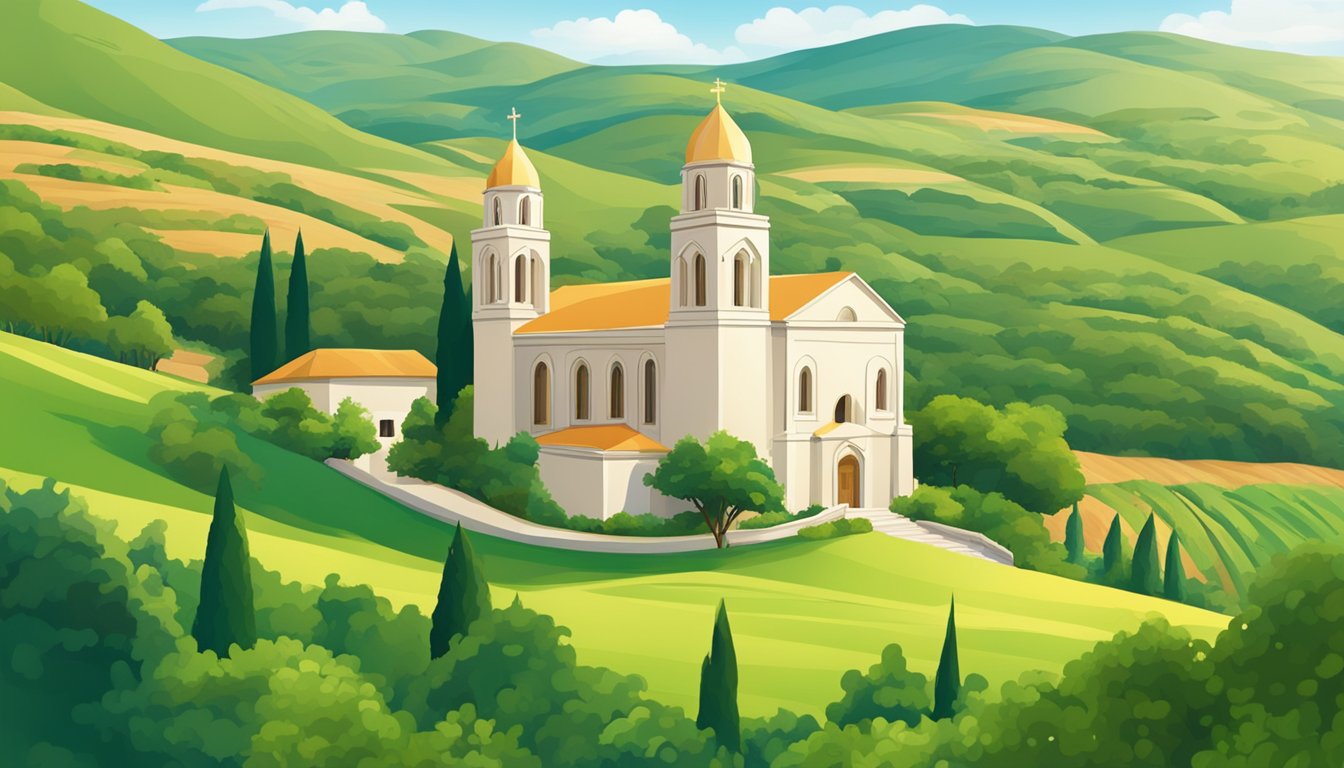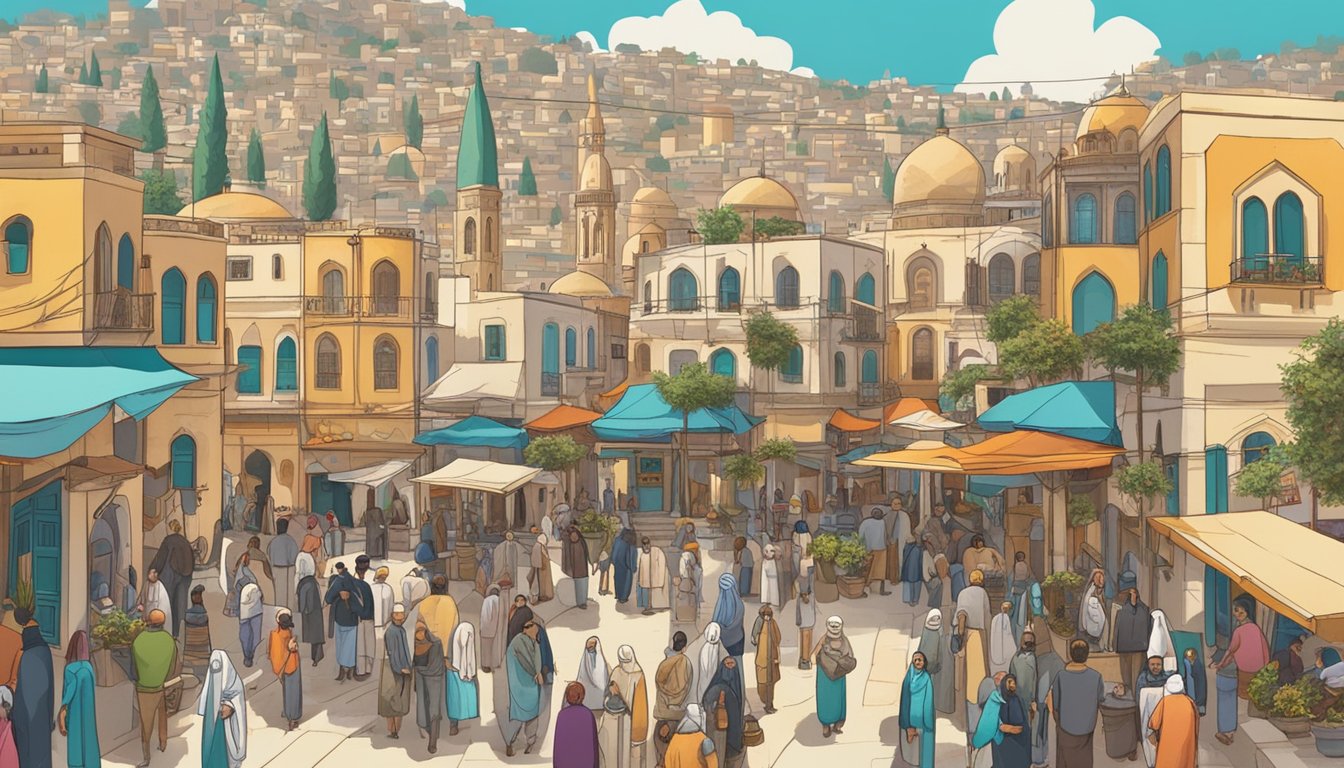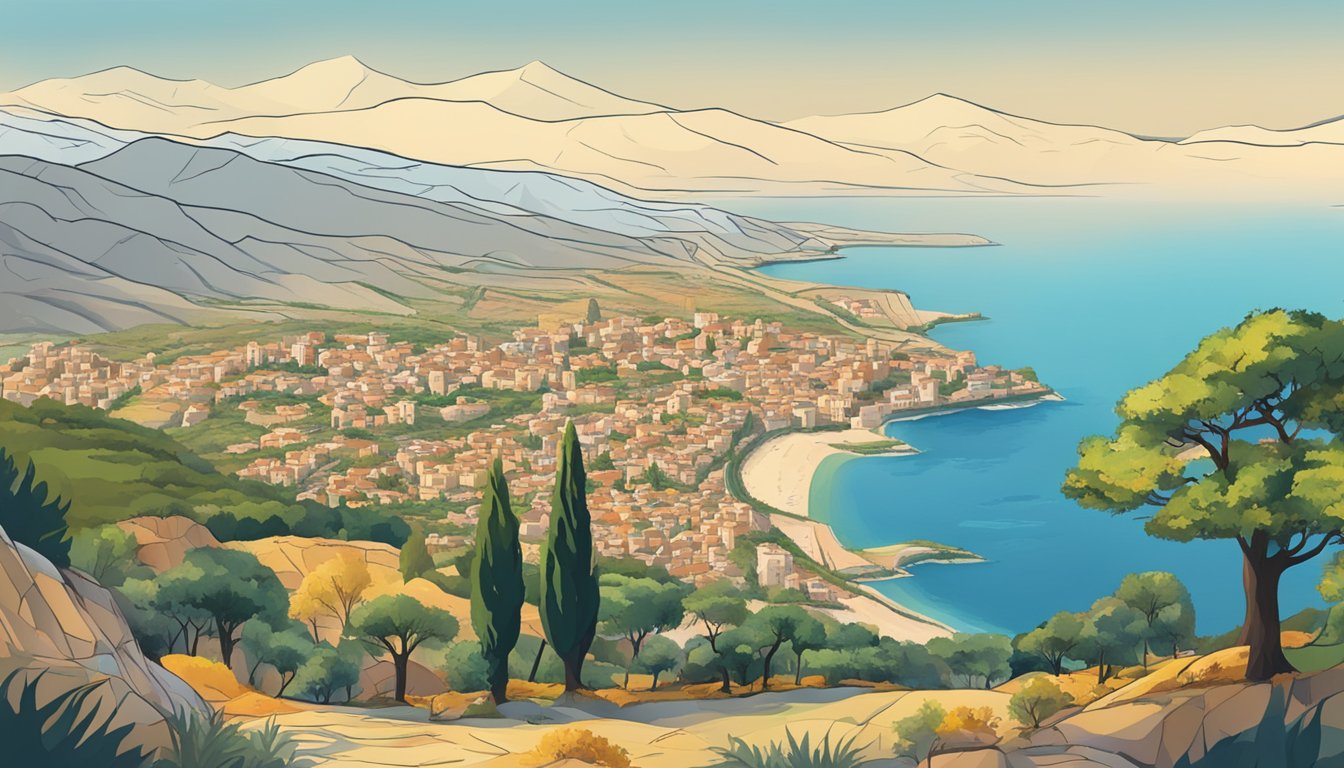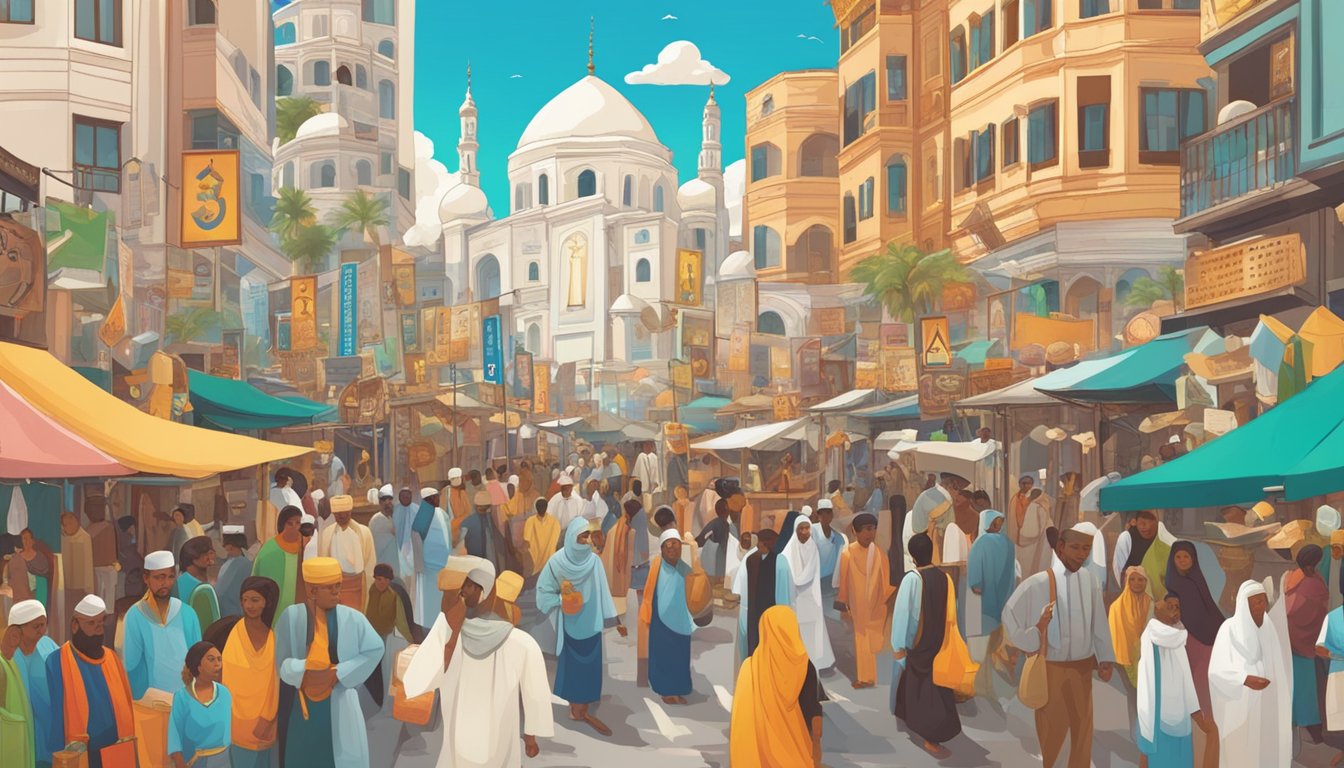Lebanon is a country located in the Middle East with a rich and diverse history. One of the most interesting aspects of Lebanon is its religious diversity, with 18 recognized religious sects in the country. Christianity is one of the major religions in Lebanon, and it has had a profound impact on various aspects of Lebanese culture.
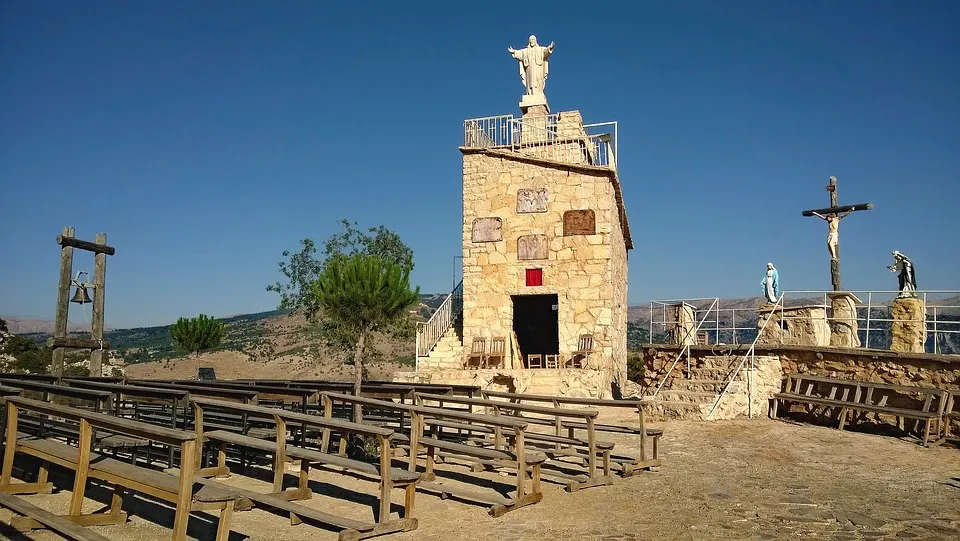
Lebanon is often referred to as a “Christian country,” but this label is somewhat misleading. While Christianity is an important part of Lebanese culture and society, Lebanon is actually a multi-religious country with a significant Muslim population as well. Nevertheless, Christianity has played a crucial role in shaping Lebanese history and culture, and it remains an important part of the country’s identity today.
Key Takeaways
- Lebanon is a multi-religious country with 18 recognized religious sects.
- Christianity is an important part of Lebanese culture and society, but Lebanon is not exclusively a Christian country.
- Christianity has had a profound impact on various aspects of Lebanese culture, including arts, literature, philosophy, festivals, holidays, cuisine, music, and media.
Historical Context of Religion in Lebanon
https://www.youtube.com/watch?v=aMRJJzC9V7Y&embed=true

Lebanon is known for its religious diversity, and the country’s religious identity has been shaped by a complex history of religious, political, and social factors. This section will provide a brief overview of the historical context of religion in Lebanon, including the Christian roots and early history of the country, the Islamic influence and the growth of other religions, and the National Pact and its impact on the religious balance.
Christian Roots and Early History
Lebanon has a long history of Christianity, dating back to the 1st century AD when Saint Peter is said to have established a Christian community in the region. The Maronite Church, which is the largest Christian denomination in Lebanon, traces its roots back to the 4th century AD when Saint Maron founded the Maronite monastic movement. The Maronites are Eastern Catholics who follow the Syriac Maronite Church, which is in full communion with the Roman Catholic Church.
Islamic Influence and the Growth of Other Religions
Islam arrived in Lebanon in the 7th century AD and gradually spread throughout the region. The Sunni and Shia Muslim communities are the largest religious groups in Lebanon after the Christians. The Druze community is another significant religious group in Lebanon, and it is considered a separate religion from Islam. The Druze faith originated in Egypt in the 11th century AD and is a monotheistic religion that incorporates elements of Islam, Judaism, and Christianity.
In addition to Christianity and Islam, other religions have also played a significant role in shaping the religious landscape of Lebanon. The Jewish community in Lebanon dates back to ancient times, although it is now very small. The Baháʼí Faith, which originated in Iran in the 19th century, also has a small presence in Lebanon.
The National Pact and Its Impact on Religious Balance
The National Pact, which was signed in 1943, established a power-sharing agreement between the Christian and Muslim communities in Lebanon. Under the agreement, the President of Lebanon must be a Maronite Christian, the Prime Minister must be a Sunni Muslim, and the Speaker of the Parliament must be a Shia Muslim. This power-sharing arrangement has helped to maintain a delicate religious balance in Lebanon, although it has also been a source of tension and conflict at times.
The Civil War, which lasted from 1975 to 1990, had a significant impact on the religious landscape of Lebanon. The war was fought along religious and sectarian lines, and it led to the displacement of many people and the destruction of many religious sites. Despite the challenges of the Civil War, Lebanon has managed to maintain its religious diversity and tolerance, and it remains a unique example of religious coexistence in the Middle East.
Demographics of Lebanese Society
Lebanon is a country located in the Middle East with a diverse population of approximately 6 million people. The population is composed of various religious groups, with Muslims and Christians being the most prominent. According to the most recent data, the Christian population in Lebanon is estimated to be around 33% of the total population. Among the Christian denominations in Lebanon, the Maronite Catholics are the largest group, accounting for a significant portion of the Christian population.
Population Distribution by Religion
Lebanon has a rich history of religious diversity, with 18 recognized religious sects. Muslims and Christians are the two largest religious groups in the country. Muslims make up the majority of the population, with Shia Muslims being the largest Muslim sect in Lebanon. Sunni Muslims are also present, but in smaller numbers. Christians, on the other hand, are divided into various denominations, with the Maronite Church being the largest Christian denomination in Lebanon.
Christian Communities in Lebanon
Lebanon has the highest proportion of Christians of any Middle Eastern country, estimated to be between 34% and 40% of the population. The Christian community in Lebanon is divided into various denominations, including the Maronites, the Greek Orthodox Church, and the Melkite Greek Catholic Church, among others. The Maronites are the largest Christian community in Lebanon, with a population of approximately 1.2 million people. They are known for their unique religious practices and traditions, which have been preserved for centuries.

In conclusion, Lebanon is a country with a diverse population composed of various religious groups. While Muslims make up the majority of the population, Christians are also present in significant numbers, with the Maronites being the largest Christian community in Lebanon. The demographics of Lebanese society reflect the country’s rich history and cultural heritage, which have been shaped by centuries of religious diversity and coexistence.
The Political Landscape and Religious Representation
https://www.youtube.com/watch?v=3KWyBlzJhtg&embed=true
Lebanon is known for its diverse religious landscape, and this is reflected in the country’s political system. The Lebanese parliament is divided among religious groups, with each group receiving a certain number of seats based on their population.
Religious Groups and Parliamentary Seats
The Christian population in Lebanon is estimated to be between 34% and 40%, making it the largest religious group in the country. The Maronite Church, which is the largest Christian denomination in Lebanon, holds 34 of the 128 seats in parliament. Other Christian groups, such as the Lebanese Forces Party, also hold seats in parliament.
The Muslim population in Lebanon is divided between the Shia and Sunni sects, with the Shia being the largest group. Hezbollah, a Shia political party and militant group, holds 13 seats in parliament. Other Shia groups also hold seats in parliament. Sunni groups, such as the Future Movement, also hold seats in parliament.
The Druze, a small religious group that is unique to Lebanon, hold 8 seats in parliament.
Influence of Religious Parties
« Is Easter a Christian Holiday? Explained
Is “Rivers of Babylon” a Christian Song? Exploring the Religious Themes in the Popular Tune »
Religious parties play a significant role in Lebanese politics. The Maronite Church, for example, has historically been involved in politics and has played a role in the election of Maronite politicians. Hezbollah, on the other hand, is a powerful political and military force in Lebanon and has significant influence in the government.
The influence of religious parties in Lebanese politics has been a source of tension and conflict in the country. The civil war that took place in Lebanon from 1975 to 1990 was largely a result of religious and political divisions in the country.
In conclusion, the political landscape in Lebanon is closely tied to the country’s diverse religious landscape. Religious groups hold a significant number of seats in parliament and religious parties have significant influence in the government. This has led to tension and conflict in the past, but also reflects the unique character of Lebanese society.
Religious Freedom and Interfaith Relations
https://www.youtube.com/watch?v=2as6XfaJkng&embed=true

Lebanon is a country where religious diversity is deeply ingrained in its social fabric. The Lebanese constitution guarantees freedom of religion and the free exercise of religious rites for all religious groups 1. The country has a population of approximately 6.8 million people, composed of 18 officially recognized religious groups 1. Christians and Muslims make up the majority of the population, with each group accounting for about 30-35% of the population 1.
Tolerance and Coexistence
Lebanon is known for its long tradition of interfaith coexistence and tolerance. The country has a unique history of religious diversity, which has fostered a culture of mutual respect and understanding among different religious communities. For example, the Maronite-Druze Dualism, which dates back to the Ottoman period, is a model of peaceful coexistence between two distinct religious groups 1.
Challenges and Discrimination
Despite the country’s tradition of tolerance and coexistence, there have been incidents of discrimination and persecution based on religious identity. Discrimination against non-Muslims in employment and education has been reported 1. Civil marriage is not recognized in Lebanon, which can create difficulties for couples of different religions who wish to marry 1. Additionally, there have been reports of harassment and violence against religious minorities 1.
In conclusion, while Lebanon has a long tradition of interfaith tolerance and coexistence, there are still challenges that need to be addressed to ensure religious freedom and equality for all Lebanese citizens.
References:

[1] United States Department of State. (2022). 2022 Report on International Religious Freedom: Lebanon. Retrieved from https://www.state.gov/reports/2022-report-on-international-religious-freedom/lebanon/.
Cultural Influence of Christianity in Lebanon
https://www.youtube.com/watch?v=-54P02dUd_E&embed=true
Lebanon is a country with a rich cultural heritage, and Christianity has played a significant role in shaping its identity. The followers of Jesus in Lebanon, known as Maronites, were among the first Christians in the region. The Maronite Church, which has its origins in the 4th century, is an Eastern Catholic Church in full communion with the Pope in Rome. Other Christian denominations in Lebanon include Greek Catholics, Armenian Orthodox, and Protestants.
Christian Holidays and Traditions
Christian holidays and traditions have had a significant impact on Lebanese culture. Christmas and Easter are widely celebrated in Lebanon, and many Lebanese Christians observe Lent, a period of fasting and reflection leading up to Easter. The Feast of the Assumption, which celebrates the Virgin Mary’s ascent into heaven, is also an important holiday in Lebanon, particularly for Maronite Catholics.
Language and Education
Christianity has also had an impact on the language and education in Lebanon. Arabic is the official language of Lebanon, but French and English are also widely spoken, particularly among Christians. Many Christian schools in Lebanon offer bilingual education in Arabic and French or English, and some of the most prestigious universities in the country were founded by Christian religious orders.

Overall, Christianity has had a profound influence on the culture and identity of Lebanon. From its early roots among the Maronites to its continued presence in Lebanese society today, Christianity has left an indelible mark on the country and its people.
The Role of the Lebanese Diaspora
https://www.youtube.com/watch?v=aOhJxlOfGq8&embed=true
Lebanon has a significant diaspora population, consisting of Lebanese migrants and their descendants who have emigrated from Lebanon and now reside in other countries. The diaspora population is estimated to be over 4 million, which is more than the population of Lebanon itself, which stands at around 4 million citizens. The Lebanese diaspora is spread across the world, with the majority of them living in the Americas, Europe, and Africa.
Emigration and its Effects on Demographics
The Lebanese diaspora population consists of Christians, Muslims, Druze, and Jews. The Christians trace their origin to several waves of emigration, starting with the Maronites who fled to the mountains during the Ottoman Empire. The Lebanese Civil War (1975-1990) also caused a significant outflow of Lebanese Christians. As a result, the diaspora population is predominantly Christian and has played a significant role in shaping Lebanon’s religious and cultural identity.
Emigration has also had profound effects on Lebanon’s demographics. The country has experienced a brain drain as many of its skilled professionals and entrepreneurs have left the country in search of better opportunities. This has had a negative impact on the country’s economy and development.
Diaspora Contribution to Lebanon

Despite the challenges posed by emigration, the Lebanese diaspora has made significant contributions to Lebanon. The diaspora is a vital source of remittances, which is a significant source of income for many Lebanese families. Remittances from the diaspora account for a significant portion of the country’s Gross Domestic Product (GDP).
The diaspora has also played a crucial role in promoting Lebanon’s culture and heritage. Lebanese expatriates have established cultural organizations and festivals in their host countries, which have helped to raise awareness of Lebanon’s rich cultural heritage.
In conclusion, the Lebanese diaspora has had a significant impact on Lebanon’s demographics, economy, and culture. While emigration has posed challenges for the country, the diaspora has made significant contributions to the country’s development and identity.
Lebanon’s Geopolitical Context
Lebanon is a small country located in the Middle East, bordered by Syria to the north and east, Israel to the south, and the Mediterranean Sea to the west. Due to its strategic location, Lebanon has been the site of numerous regional conflicts and alliances.
Regional Conflicts and Alliances

Lebanon’s geographical location has made it a battleground for regional conflicts. The country has been affected by the Syrian Civil War, which began in 2011. The influx of Syrian refugees has put a strain on Lebanon’s resources and has led to social and economic challenges. Hezbollah, a Shia Islamist political party and militant group, has been involved in the Syrian conflict, supporting the Syrian government.
Lebanon has also been impacted by the Israel-Palestine conflict. Southern Lebanon was occupied by Israel from 1982 to 2000, which led to the formation of Hezbollah. The group has been involved in numerous conflicts with Israel, including the 2006 Lebanon War.
Impact of Neighboring Countries
Lebanon’s relationships with its neighboring countries have had a significant impact on the country’s political and economic situation. Syria has historically played a dominant role in Lebanese politics, and the two countries have close cultural and economic ties. However, the Syrian Civil War has strained their relationship, with Lebanon supporting different factions in the conflict.
Iran has also been involved in Lebanese politics, providing support to Hezbollah. The group has been accused of carrying out terrorist attacks against Israeli and Western targets, which has led to sanctions against Iran.
Israel’s relationship with Lebanon has been hostile, with the two countries engaging in numerous conflicts. Israel has accused Hezbollah of carrying out attacks against Israeli targets, and the group has been designated as a terrorist organization by Israel, the United States, and several other countries.

In conclusion, Lebanon’s geopolitical context is complex and has been shaped by regional conflicts and alliances. The country’s relationships with its neighboring countries have had a significant impact on its political and economic situation.
Economic and Social Issues
Lebanon is facing several economic and social issues that have affected the country’s stability and status as a haven for Christians.
Poverty and Unemployment
Lebanon is facing a severe economic crisis that has led to hyperinflation and a sharp decline in the value of the Lebanese pound. As a result, the country is experiencing high levels of poverty and unemployment. According to the United Nations Economic and Social Commission for Western Asia, approximately 80% of Lebanon’s population lives below the poverty line, and 36% are unemployed.
Corruption and Reform
Corruption has been a long-standing issue in Lebanon, and it has contributed to the country’s economic challenges. The Taif Agreement, which ended the Lebanese Civil War in 1989, was supposed to usher in a new era of political and economic reform. However, corruption has remained a pervasive problem in the country, and it has hindered efforts to address economic challenges and promote stability.

Efforts to address corruption and promote reform have been met with resistance from powerful political and economic elites. In 2020, protests broke out across the country calling for an end to corruption and the resignation of the government. However, the COVID-19 pandemic and the economic crisis have slowed progress towards reform.
In conclusion, Lebanon’s economic and social issues have had a significant impact on the country’s status as a haven for Christians. The country’s high levels of poverty and unemployment, coupled with pervasive corruption, have hindered efforts to promote stability and reform.
Religious Sites and Tourism
https://www.youtube.com/watch?v=F42JfeIuUCo&embed=true
Lebanon is a country with a rich religious history and heritage, making it a popular destination for religious tourism. Visitors can find a variety of religious sites throughout the country, including churches, monasteries, and shrines.
Churches and Monasteries
Lebanon is home to a number of historic churches and monasteries, many of which date back centuries. The Maronite Church, Greek Orthodox Church, and Armenian Apostolic Church are among the most prominent Christian denominations in Lebanon.

One popular destination for religious tourists is the Our Lady of Lebanon Shrine, located in the town of Harissa. The shrine features a large statue of the Virgin Mary and attracts thousands of visitors each year.
Other notable religious sites include the Saint George Maronite Cathedral in Beirut, the Saint John the Baptist Monastery in Khreibe, and the Saint Charbel Monastery in Annaya.
Religious Festivals and Pilgrimages
In addition to its religious sites, Lebanon is also known for its religious festivals and pilgrimages. One of the most popular events is the Feast of Saint Maroun, which celebrates the founder of the Maronite Church. The festival is held in the town of Jbeil and features a variety of religious and cultural activities.
Another popular event is the Hikayat Festival, held in the town of Sidon. The festival celebrates the life of Saint John the Baptist and features a variety of religious and cultural events.
Pilgrimages are also common in Lebanon, with many visitors traveling to the country to visit holy sites and shrines. The Our Lady of Lebanon Shrine and the Saint Charbel Monastery are among the most popular destinations for pilgrims.
Overall, Lebanon’s rich religious history and heritage make it a fascinating destination for religious tourists. Visitors can explore a variety of religious sites, attend festivals and events, and participate in pilgrimages.
Future of Christianity in Lebanon
https://www.youtube.com/watch?v=pebkcWU5JW8&embed=true
Lebanon, with its diverse mix of faiths, has a long history of religious coexistence. However, the future of Christianity in Lebanon remains uncertain due to various factors. In this section, we will explore the prospects for the future of Christianity in Lebanon.
Youth and Religious Identity
One of the main challenges facing Christianity in Lebanon is the changing religious identity of the country’s youth. According to a survey conducted by the Lebanese Center for Policy Studies, the youth in Lebanon are increasingly identifying themselves as Lebanese first and religious second. This trend is particularly evident among Christians, who traditionally have identified themselves primarily as Christians and secondarily as Lebanese.
Another factor contributing to the changing religious identity of the youth in Lebanon is the increasing secularization of society. The youth in Lebanon are becoming more liberal and less religious, which is leading to a decline in religious observance and practice. This trend is particularly evident among Christian youth, who are increasingly questioning the relevance of religion in their lives.
Prospects for Peace and Unity
The future of Christianity in Lebanon also depends on the prospects for peace and unity in the country. Lebanon has a long history of sectarian conflict, which has often led to violence and instability. The Lebanese Republic has made significant progress in recent years towards promoting religious freedom and tolerance, but much work remains to be done.
One of the key challenges facing Christianity in Lebanon is the fragmentation of Christian communities. There are several different Christian denominations in Lebanon, each with its own distinct identity and traditions. This fragmentation has often led to tensions and conflicts between different Christian communities.
Samir Geagea, the leader of the Lebanese Forces political party, has been a vocal advocate for Christian unity in Lebanon. Geagea has called for greater cooperation and dialogue among Christian communities, and has urged Christians to work together to promote peace and stability in the country.
In conclusion, the future of Christianity in Lebanon is uncertain, but there is reason for hope. The Lebanese Republic has made significant progress towards promoting religious freedom and tolerance, and there are many individuals and organizations working to promote peace and unity in the country. With continued efforts towards promoting interfaith dialogue and cooperation, there is hope that Christianity will continue to thrive in Lebanon for many years to come.
Frequently Asked Questions
https://www.youtube.com/watch?v=U5EyiBC5td0&embed=true
What is the current Christian population percentage in Lebanon?
As of 2023, the Christian population in Lebanon is estimated to be around 35% of the total population. However, due to the country’s complex religious demographics, it is difficult to determine an exact number.
How has the Christian population in Lebanon changed over time?
The Christian population in Lebanon has undergone significant changes over the past century. Prior to the Lebanese Civil War, which lasted from 1975 to 1990, Christians made up the majority of the population. However, due to emigration and a lower birth rate compared to the Muslim population, the Christian population has decreased over time.
What was the dominant religion in Lebanon before the spread of Islam?
Before the spread of Islam, the dominant religion in Lebanon was Christianity. The Maronite Church, which is still one of the largest Christian denominations in Lebanon today, traces its roots back to the 4th century.
How does Lebanon’s religious demographic compare to that of other Arab countries?
Lebanon’s religious demographic is unique compared to other Arab countries. While most Arab countries have a Muslim majority, Lebanon has a significant Christian population, as well as a sizable Muslim population. This diversity has led to a complex political and social landscape in Lebanon.
Are there any known instances of Christian persecution in Lebanon?
While there have been instances of sectarian violence in Lebanon, there is no evidence to suggest that Christians are systematically persecuted in the country. In fact, Lebanon has a long history of religious tolerance and coexistence.
What is the main religion practiced in Lebanon today?
Islam and Christianity are the two main religions practiced in Lebanon today. The Muslim population is predominantly Sunni, with smaller numbers of Shia and Alawites. The Christian population is divided among various denominations, including the Maronite Church, the Greek Orthodox Church, and the Melkite Greek Catholic Church.

